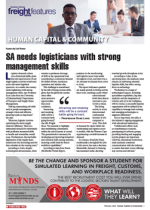ccessing extensive talent pools through specialised online recruitment platforms is a game-changer for organisations. Not only do these platforms reduce time-to-hire and recruitment costs, but they also enable the collection of data to offer crucial insights into market trends, addressing the pressing issue of a worldwide skills shortage. According to Ilana Bouwer, head of sales at Pnet, the essential strategy has to do with delving into actionable data. “The key is to dig into the data and not just to identify the skills in demand, but also to understand what is realistically available.”Bouwer says the Pnet Job Market Trends Report provides important insights into recruitment and employment trends in the South African market. Developed to give local businesses a useful summary of trends shaping the local recruitment market, this report unpacks specific sector insights. “Recruiters can use this data to develop their recruitment strategies and to guide and advise their HR talent-management solutions constructively,” explains Bouwer. “When a specific skill is scarce, it’s crucial to figure out practical solutions. This may involve developing junior roles, upskilling existing employees or creating alternative positions to fill the skills gap. “Moreover, there is a push for efficiency by proactively building talent pools for future roles. This forward-looking approach allows talent teams to build relationships with top professionals before job openings arise, cutting down on hiring time and making it more likely to attract the best talent.”According to Bouwer, working with a recruitment partner like Pnet is critical as it allows one to advance the search from an online recruitment platform to a higher level. “Ultimately, it is about cutting down on unnecessary recruitment costs, reducing time-to-hire, and boosting overall efficiency. Built-for-purpose online recruitment platforms are emerging as powerful tools to help companies of all sizes find the right candidates for their vacant roles, thereby boosting their competitiveness in the market and staying relevant.”She says understanding the challenges in managing one’s workforce also becomes clearer when one looks at the data. Taking actions based on this understanding allows recruiters to focus on developing and structuring skills to meet their current needs. This is particularly relevant in the warehousing and logistics sector, which faces several specific challenges. “The sector faces a lack of experience and skills,” says Bouwer. “Secondly, the time-to-hire can also be lengthy. Due to the nature of the industry, it is important to fill roles as quickly as possible to mitigate downtime in procurement and supply.”

